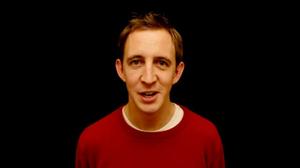
|
|
| photo: Phil Bambridge | |
Nathan Filer is a writer and a mental health nurse. He has worked on an inpatient psychiatric ward, and since 2007 has been a researcher at the academic unit of psychiatry at the University of Bristol. Filer graduated from the prestigious Bath Spa Creative Writing with an MA in 2011. This is his first novel. He lives in Bristol with his family.
Where the Moon Isn't has a truly unique structure and storyline and successfully blends elements of many genres. How did the idea for the story first manifest for you? Did characters or plot first present themselves to you—or neither of these?
It started with two short sentences:
"I had no intention of putting up a fight, but these guys weren't to know that. And nobody was taking any chances."
That was the opening line from my first draft. It wasn't called Where the Moon Isn't back then. It wasn't called anything, and I didn't know that it was going to be a novel. It was just those two sentences repeating in my head, and an immediate sense of the character who had said them: Matthew Homes, 19, a chipped front tooth, a tentative diagnosis of schizophrenia, and a dead big brother who refused to stay dead. I then wrote, re-wrote and tweaked a scene depicting a group of nurses restraining and medicating Matthew on a psychiatric unit. I drew upon my own experiences as a nurse to get the setting right, the terminology, the surprising methodical calm. Then I deleted the lot. Virtually nothing from the first draft of my novel made it into the book you've read. Nothing except Matthew. He stuck around, year after year—growing ever more real to me. And with him emerged his parents, Nanny Noo, his best friend Jacob, Click-Click-Wink Steve, The Pig and all the other people who make this novel whole. I stopped thinking so much about what I wanted to happen in the story, resolving instead to let Matthew lead the way. He never stopped surprising me. With the right characters, I think plots take care of themselves.
 Memory, and its notoriously misleading and unreliable nature, is a strong theme throughout the novel. For Matthew, in fact, memory almost seems a form of madness. How did this theme develop for you?
Memory, and its notoriously misleading and unreliable nature, is a strong theme throughout the novel. For Matthew, in fact, memory almost seems a form of madness. How did this theme develop for you?
I think Matthew is desperate to be honest. One of the few things he has any real control over is the way that he tells this story, so he's determined to get it right. Of course his memory is flawed. That goes for all of us, no? Unreliable narrators are hardly the reserve of literature; we are each of us the unreliable narrator of our own life, revisiting key moments with fresh agendas and new sympathies. I don't think Matt's memories are any less reliable than yours or mine. In fact, often Matthew seems more reliable because he is so aware of his limitations, and because he doesn't have an agenda or a desire to make himself look good. That's not something we can all say. Not truthfully, anyway. And it isn't really something that Susan (Matt's mum) could say. I think her memory is the most flawed, but then, she has the most to lose in confronting the truth. I need to be careful not to give too much away. The point is, in talking about the past, we lie with every breath we draw.
 Matthew is an incredibly complex character and you portray him with such nuance and depth. Did you find it difficult to inhabit this character over the course of the novel?
Matthew is an incredibly complex character and you portray him with such nuance and depth. Did you find it difficult to inhabit this character over the course of the novel?
I never had the experience we sometimes hear other writers talk about, when a character arrives in their imagination fully formed. I had a reasonable sense of Matt, but like you say, he's a complicated chap. So I got to know him by spending time in his company. We'd pace the paving slabs in my back garden, with a mug of cold tea and a roll-up, muttering a few dozen versions of the same paragraph; stripping back anything too sentimental, too indulgent or too me. I was holding down a job whilst writing, so I often wrote very late at night or in the small hours of the morning, when all edges seem blurred, not least our own. At times like that, I wasn't really sure who was inhabiting whom. Certainly I felt his emotional journey (and at times his sleep deprivation) but I also know that I'm lucky. Matt was always having a harder time than me; my task was to be sensitive towards him, to prioritise his priorities—and to be kind. It's strange now letting him go. I feel protective, somehow. But I'm also very proud to be able to share his story. We'll inhabit each other for a good while yet.
Each member of the Homes family has his or her own mental or emotional challenges—some of these obvious and others not as much. Which, in your opinion, are the most debilitating and why?
They have a lot of strengths, too, though, no?
Matthew is funny and clever and perceptive. His mother is unshakably committed to him. His dad has a quiet hope and belief (shown in the words he writes on the bedroom wall). And as for Nanny Noo—if we each had a grandmother like her, I reckon the world would be a much nicer place. I'm not avoiding your question here because you are right that these people have their issues. I tend to think that the emotional challenges of this family reside in the spaces between them. If we take the anxieties of Susan, it wouldn't be true to say that these exist in her head, somehow separate from the world. They are much too wrapped up in her relationship with Matthew for that. And Matthew's illness is so bound up in what happened with his brother. But also in this space between them is a huge amount of resilience and kindness. And I don't think of any one of them as being somehow more debilitated than the others because that's not how they would see it. They're a family. They're in this together.
What would you most like readers to take away from Where the Moon Isn't?
A desire to share it. —Debra Ginsberg

